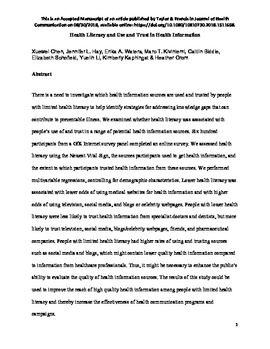| dc.contributor.author | Chen, Xuewei | |
| dc.contributor.author | Hay, Jennifer L. | |
| dc.contributor.author | Waters, Erika A. | |
| dc.contributor.author | Kiviniemi, Marc T. | |
| dc.contributor.author | Biddle, Caitlin | |
| dc.contributor.author | Schofield, Elizabeth | |
| dc.contributor.author | Li, Yuelin | |
| dc.contributor.author | Kaphingst, Kimberly | |
| dc.contributor.author | Orom, Heather | |
| dc.date.accessioned | 2020-02-24T20:34:58Z | |
| dc.date.available | 2020-02-24T20:34:58Z | |
| dc.date.issued | 2018-08-30 | |
| dc.identifier | oksd_chen_healthliteracy_2018 | |
| dc.identifier.citation | Chen, X., Hay, J. L., Waters, E. A., Kiviniemi, M. T., Biddle, C., Schofield, E., ... Orom, H. (2018). Health literacy and use and trust in health information. Journal of Health Communication, 23(8), 724-734. https://doi.org/10.1080/10810730.2018.1511658 | |
| dc.identifier.uri | https://hdl.handle.net/11244/323770 | |
| dc.description | This is a post-print of an article whose final version has been published in Journal of Health Communication, Taylor and Francis, 2018. | |
| dc.description.abstract | There is a need to investigate which health information sources are used and trusted by people with limited health literacy to help identify strategies for addressing knowledge gaps that can contribute to preventable illness. We examined whether health literacy was associated with people?s use of and trust in a range of potential health information sources. Six hundred participants from a GfK Internet survey panel completed an online survey. We assessed health literacy using the Newest Vital Sign, the sources participants used to get health information, and the extent to which participants trusted health information from these sources. We performed multivariable regressions, controlling for demographic characteristics. Lower health literacy was associated with lower odds of using medical websites for health information and with higher odds of using television, social media, and blogs or celebrity webpages. People with lower health literacy were less likely to trust health information from specialist doctors and dentists, but more likely to trust television, social media, blogs/celebrity webpages, friends, and pharmaceutical companies. People with limited health literacy had higher rates of using and trusting sources such as social media and blogs, which might contain lower quality health information compared to information from healthcare professionals. Thus, it might be necessary to enhance the public's ability to evaluate the quality of health information sources. The results of this study could be used to improve the reach of high quality health information among people with limited health literacy and thereby increase the effectiveness of health communication programs and campaigns. | |
| dc.format | application/pdf | |
| dc.language | en_US | |
| dc.publisher | Taylor and Francis | |
| dc.rights | This material has been previously published. In the Oklahoma State University Library's institutional repository this version is made available through the open access principles and the terms of agreement/consent between the author(s) and the publisher. The permission policy on the use, reproduction or distribution of the material falls under fair use for educational, scholarship, and research purposes. Contact Digital Resources and Discovery Services at lib-dls@okstate.edu or 405-744-9161 for further information. | |
| dc.title | Health literacy and use and trust in health information | |
| osu.filename | oksd_chen_healthliteracy_2018.pdf | |
| dc.description.peerreview | Peer reviewed | |
| dc.identifier.doi | 10.1080/10810730.2018.1511658 | |
| dc.description.department | Community Health Sciences, Counseling and Counseling Psychology | |
| dc.type.genre | Article | |
| dc.type.material | Text | |
| dc.subject.keywords | health literacy | |
| dc.subject.keywords | health information source | |
| dc.subject.keywords | health communication | |
| osu.authorOrcid.uri | http://orcid.org/0000000163911459 | |
